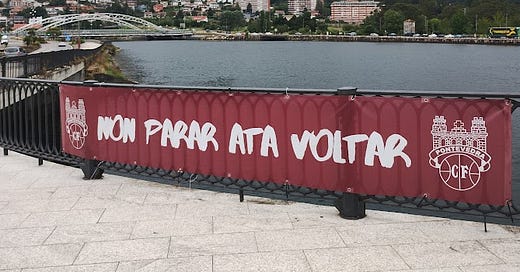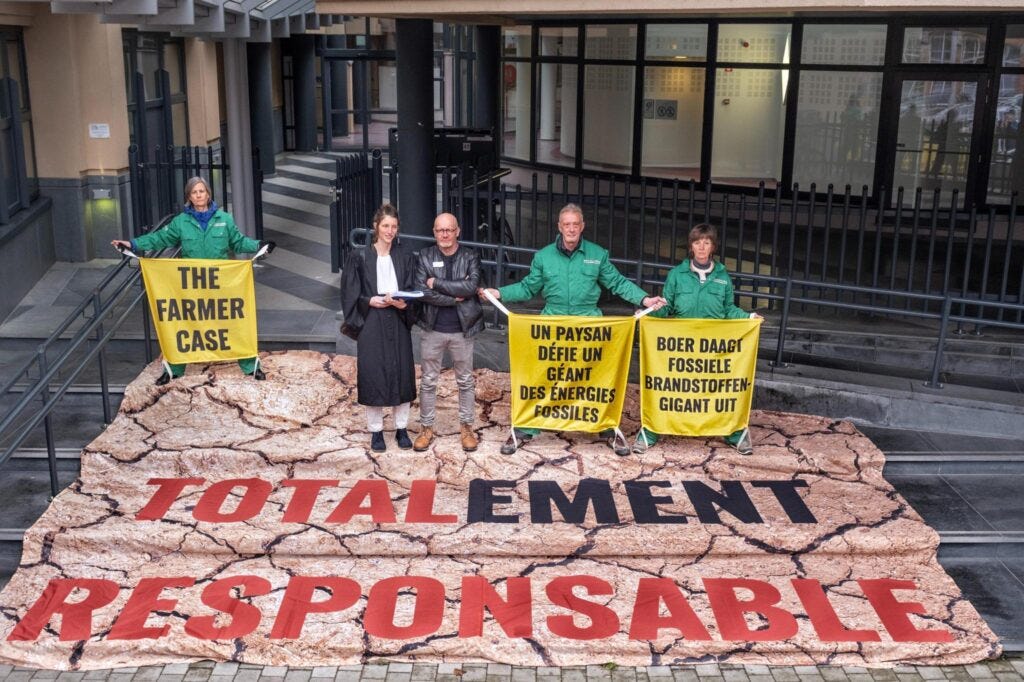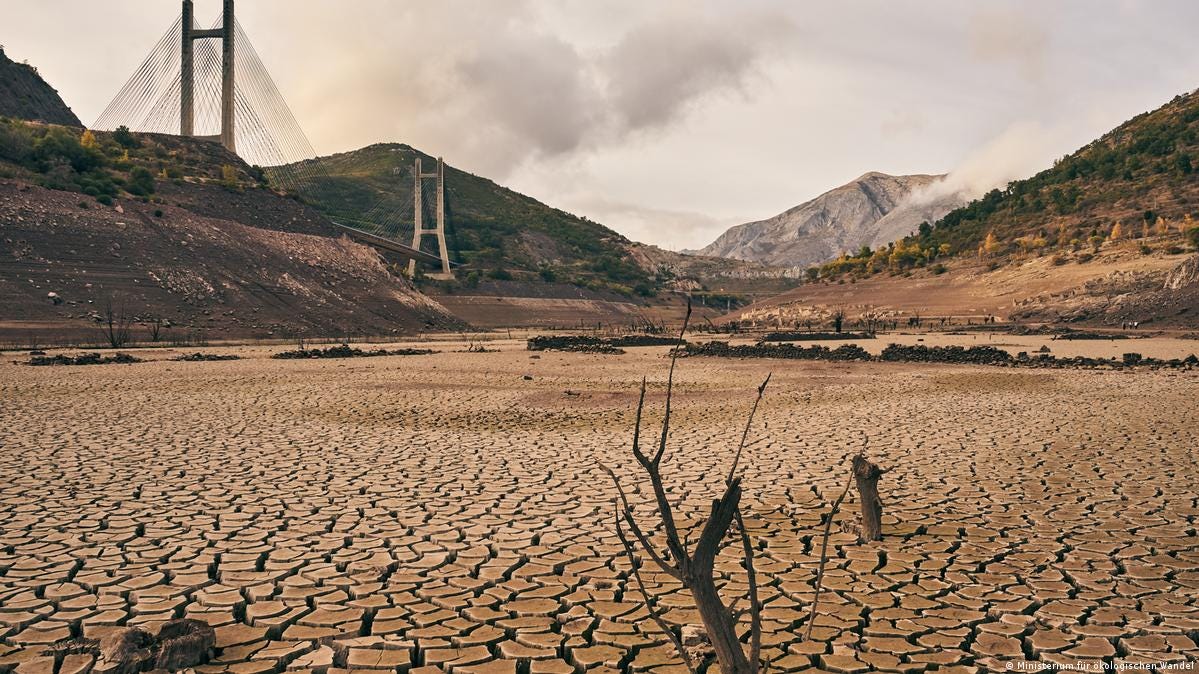Imperfect activists will build imperfect worlds - it's still better than what we have now.
A talk on imperfection in climate movements, and an interview with the Belgian farmer taking TotalEnergies to court.
Are you a perfectionist? I used to be.
I met up with a friend yesterday after work.
She’s been wanting to quit her job for ages, it was making her miserable. She wants to do something totally different, creative maybe. It’s been the same situation for a long time. “I don’t know if anyone would hire me. At least my current job is stable. Maybe it’s not that bad. I’m used to it. It’s probably stupid to change it.”
“But you’re unhappy.”
“Yes but I just need more of a plan before I leave, I think.”
I wonder how many of you relate to this - stress, economic and climate instability has made us an increasingly anxious society.
Last week I was in Spain for the International Degrowth Conference. It was very academic-heavy. The people I talked to were all doing PhDs on intelligent-sounding things like ‘spatial-temporal praxes of activism’ and ‘alternative pedagogies.’
We talked intensively. About ways of thinking and ways of being and about degrowth and justice and community, all the intangible yet crucial things we try to protect without being able to define. Usually the discussions were full of life and ideas and then someone would raise a good point about a problem with that particular method or theory and we would all nod and say that more thinking is needed.
We love to talk and read and think. They are some of the most destabilising things you can do to a government. There’s a reason repressive regimes try to attack academia, science and free speech.
But I wonder how many ideas have been stalled at the idea phase. If the road to hell is paved with good intentions, the roads to both freedom and annihilation are paved with good ideas. The difference is whether we embrace the potential of an imperfect idea, or whether we stay discussing forever in pursuit of the perfect theory, perfect new economy, perfect activist, before we can remove the current system.
I’m not here to criticise academia or to dismiss justified critiques of movements. I just find myself in these conferences feeling somehow disconnected from the rest of the world. Action and implementation are necessary counterparts to ideas for system disruption.
Coming home from town, I was trying to write this introduction in my head, when I came across a poster for the far-right party in Belgium. In a fit of frustration I tore it off the wall (it took ages, it was stuck on). What did this achieve? Not a lot but I felt calmer afterwards. Doing something, anything.
So much of the world is already trying to prevent us from breaking out of the status quo. And then we compound it and hold ourselves back from the futures we want until we are sure our plan is perfect and that we are perfect too.
I feel that that we can stand to bank a lot more on the potential of an idea, without proof of its infallibility. We learn through talking but we also learn by doing.
Most successful movements are ecosystems, capable of improving internally and having an impact externally at the same time. The search for perfection might be the biggest flaw of all: seeking the infallible means we lose sight of all the imperfect good and imperfect activists that are already here.
Brussels Climate Drinks: Park Edition!
Join us for the final Green Fix event of the season as we take our climate drinks to the park!
Find us in Parc de Bruxelles on the 10th July after work.
Bring your friends, your colleagues, your Deliveroo driver, bring snacks and whatever drinks you like! Info on the Eventbrite and our socials.
What’s Going On?
The environmental damage of Russia’s war in Ukraine exceeds emissions of 90 million petrol cars.
Related: Youth in Hawaii took on the state government over climate change. A historic settlement emerged.EU ministers approve contested Nature Restoration Law.
Related: Save our seas: five ways to rewild and conserve the ocean.Wind and solar added more to global energy than any other source in 2023.
Related: Fossil fuel use reaches global record despite clean energy growth.Climate change to exacerbate the burden of water collection on women’s welfare globally.
Related: Behind the mangrove restoration project of the Niger Delta.
EU-funded Egyptian forces ‘rounding up and deporting Sudanese refugees’.
Related: Chiquita banana company ordered to pay Colombian families $38 million for backing death squads.
If you’d like to support The Green Fix, please consider tipping us a virtual coffee.
Focus On… the Belgian farmer suing TotalEnergies
Alexandra Vázquez Mera talks to Aline Wavreille from The Farmer Case and to FIAN about the impact of fossil fuel companies on farmers.
Hugues Falys, a farmer from Bois-de-Lessines, Belgium, is suing TotalEnergies for its responsibility for climate change. This lawsuit marks the first climate litigation against a fossil fuel company in Belgium.
The French oil and gas company, with a net profit of nearly 20 billion euros in 2023, is one of the largest emitters of greenhouse gases globally. Supported by Greenpeace, FIAN, and the Ligue des droits humains, Hugues’ lawsuit seeks to make TotalEnergies financially responsible for the damages and force the oil giant to put a plan to transition away from fossil fuels in place.
What are the impacts of climate change Hugues is seeing in his farm?
[Video in FR/NL]
Hugues is an agricultural engineer. Since 1993, he has been growing cereals, protein crops, vegetables, strawberries and legume-rich meadows, where he raises approximately 100 Charolais cows for organic meat production. His cows are fed exclusively with grass and legumes (alfalfa, clover, etc.) from his farm.
Hugues adjusts his herd size annually based on the farm's forage production. However, due to increasingly frequent heatwaves and droughts in the last 5 years, his crop yields have declined, making it difficult to produce enough feed for the animals.
Between 2000 and 2017, Hugues maintained an average herd size of 160 cattle. By 2022, he was forced to reduce the size of his herd to around 100 animals.
“Climate change on my farm is stressful, not knowing what tomorrow will bring. It's stressful in terms of work organisation. You can't sow or harvest at times when you need to.” - Hugues Falys
Climate-driven droughts and floods, and the uncertainty these impacts create, are causing stress and panic among farmers in Europe - a stress that was spotlighted by the farmer demonstrations across capital cities earlier this year.
How can the case connect climate impacts to Total specifically?
As a company, TotalEnergies has some of the highest carbon emissions globally. Despite knowing the environmental impact of greenhouse gases since 1971, the company has historically cast doubt on climate science to oppose policy changes.
The company has also a track record of greenwashing and lobbying the European Union to allocate tens of billions of euros in subsidies to support the carbon capture and storage sector.
Hugues’ case aims to raise the question of whether individual major emitters must pay for protection against climate risks.
There is a precedent for holding a multinational legally accountable for their climate impacts. Shell was taken to court in 2019 by Friends of the Earth Netherlands and ordered to reduce its emissions by 45% by 2030, compared to 2019 figures.
And last week, the Paris Court of Appeal deemed a lawsuit brought by 6 NGOs and 15 local authorities to compel TotalEnergies to align with the 1.5°C target of the Paris Agreement admissible, marking a key step forward in holding the company accountable under France's duty of vigilance law.
Hugues’ case specifically calls on the court to force TotalEnergies to transition away from fossil fuels. The demands include ending investments in fossil fuel projects, reducing greenhouse gas emissions by 60% by 2030 compared to 2023 levels, and cutting oil and gas production by 75% by 2040. And if Hugues wins this legal action, he will pay the compensation money to the Farm for Good cooperative.
How can we support the case?
The Commercial Court of Tournai held the introductory hearing on the 16th April 2024. This was when both parties agreed on the judicial procedure schedule (exchanges of conclusions, hearings, etc.).
TotalEnergies' lawyers will submit their conclusions in September this year. This case will likely be long and costly for the organisations involved.
You can support Hugues either by signing the petition to become a supporter or by participating in the crowdfunding campaign. The funds raised will be used to cover the legal costs of the case.
How can we support local farmers in the green transition?
Europe is the fastest-warming continent on Earth according to the European Environment Agency. The same report shows that crop failures and reduced yields already pose a critical risk in southern and western Europe, as extreme heat is becoming more and more common.
In April, heavy rainfall in Germany resulted in the loss of several hundred thousand hectares of arable land and grassland for farmers. And in southern Spain, the planted area for rice saw a significant decline: 53% in 2021, 69% in 2022, and 96% in 2023 compared to the average output of previous years.
A report published by the Institute for European Environmental Policy (IEEP) states that adopting practices framed as nature-based solutions, agroecology, and regenerative farming are pathways to more resilient farming systems that reduce vulnerability to climate change and other shocks.
Many farmers are switching to agroecology, but they need political and financial support. This support is crucial to help address the key concerns of the economic and administrative burden of the transition.
"I've been an organic farmer for a short time, I've made a real change on my farm to cope with climate change and be more resilient, unfortunately in the final product nobody wants to follow us because of the extra price...but when you buy our product you're not just buying a product you're also buying a safe environment for people, animals, the planet!" - Dominique Moulin, organic farmer
While citizens can do a lot by speaking out on behalf of local sustainable farmers and buying local, calling on local and national politicians to support local governments and EU directives for sustainable farming is crucial to secure a longterm just transition.
You can follow the Farmer Case on their website.
So Now What Do I Do?
LEARN SOMETHING
Join The Green Fix tonight for our post-elections hangover night! In Mundo Matonge at 19h CEST.
Read: What we are up against, by Dr Julia Steinberger.
Listen: Understanding energy justice, an episode by Black Earth Podcast.
TRY SOMETHING NEW
The International Water Association have launched their Leadership Programme for Young Water Professionals. Applications are open until 28 June.
Applications for the next cohort for the Masters in Political Ecology, Degrowth and Environmental Justice at the Universitidad Autonoma Barcelona are now open! Deadline 30th June.
Women students are welcome to apply for the Femme Lex cohort, an 8-week funded programme in eco-technology justice. Apply by 9th July.
CHANGE THE SYSTEM
In response to an op-ed by the Barclay’s CEO trying to divide the climate and Palestinian justice movements, Tipping Point UK have written an open letter welcome for everyone to sign.
Really unrelated but I just really like this article: On keeping women skinny so we don’t get too powerful.
The Green Fix is now offering low-cost sponsored slots on the newsletter. Book your slot by emailing wearethegreenfix@gmail.com.
Stay in the loop
You can follow us on Twitter @TheGreenFix, Instagram @thegreenfix_ and LinkedIn. Connect with Cass on Instagram @cass.hebron and LinkedIn Cass J Hebron.






![A photo of a billboard that says 'Conferencia ESEE-Decrecemento 2024' Ciencia, tecnoloxia e innovacion mais alo do crecemento' [Galician] A photo of a billboard that says 'Conferencia ESEE-Decrecemento 2024' Ciencia, tecnoloxia e innovacion mais alo do crecemento' [Galician]](https://substackcdn.com/image/fetch/$s_!Qlrs!,w_1456,c_limit,f_auto,q_auto:good,fl_progressive:steep/https%3A%2F%2Fsubstack-post-media.s3.amazonaws.com%2Fpublic%2Fimages%2F371256ee-64c0-4dad-9eb2-007ea40fcbab_3072x2878.jpeg)




